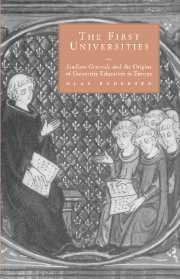Book contents
- Frontmatter
- Contents
- Preface
- Preface to the English edition
- List of abbreviations
- 1 The classical inheritance
- 2 From ancient science to monastic learning
- 3 The Carolingian Renaissance
- 4 The schools of the middle ages
- 5 From school to studium generale
- 6 The battle for the universities
- 7 Structure and form of government
- 8 The material situation
- 9 The road to degrees
- 10 Curricula and intellectual trends
- Index of names
5 - From school to studium generale
Published online by Cambridge University Press: 03 November 2009
- Frontmatter
- Contents
- Preface
- Preface to the English edition
- List of abbreviations
- 1 The classical inheritance
- 2 From ancient science to monastic learning
- 3 The Carolingian Renaissance
- 4 The schools of the middle ages
- 5 From school to studium generale
- 6 The battle for the universities
- 7 Structure and form of government
- 8 The material situation
- 9 The road to degrees
- 10 Curricula and intellectual trends
- Index of names
Summary
The strong economic and political changes in medieval society following the first millennium were accompanied by a rapid transformation within higher education. To a great extent this development can be attributed to the steadily increasing contact with ‘Arab’ culture, mediated by the hard industry of translators. Through these efforts Latin Europe came into possession of a scholarly literature of great extent for the first time since antiquity. Some of this literature was of high quality and comprised crucial parts of the best of the literary legacy of Greek scholarship, along with the works of many great thinkers and men of learning who had worked within Islam. In reality this was a true explosion of information that would clearly mean an enormous intellectual challenge for twelfth-century teaching and science. Later ages have often cherished an image of medieval polymaths, people capable of cultivating all subjects with equal competence. But this view is exaggerated. There is no doubt that after these translations appeared, the collected literature became too copious for any single teacher to cope with. An Alcuin or a Gerbert was no longer thinkable, and in no previous time had the situation seemed so hard to grasp for a teacher who wished to be universally oriented. In this context it can be understood that the schools of the twelfth century reacted to this challenge in the most logical way, namely by specialising. Everywhere we can spot a tendency to divide the work up by subject. This had the most farreaching consequences for the whole system of education.
- Type
- Chapter
- Information
- The First UniversitiesStudium Generale and the Origins of University Education in Europe, pp. 122 - 154Publisher: Cambridge University PressPrint publication year: 1998
- 1
- Cited by



